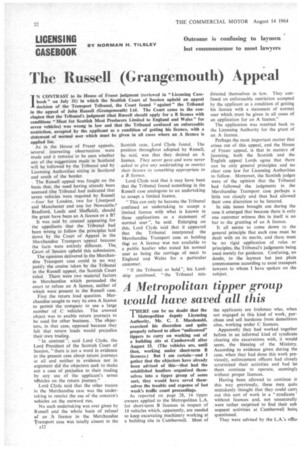The Russell (Grangemouth) Appeal
Page 34

If you've noticed an error in this article please click here to report it so we can fix it.
/ N CONTRAST to its House of Fraser judgment (reviewed in "Licensing Case book" on July 31) in which the Scottish Court of Session upheld an appeal decision of the Transport Tribunal, the Court found " against " the Tribunal in the appeal of John Russell (Grangemouth) Ltd. The Court came to the concluOon that the Tribunal's judgment (that Russell should apply for a B licence with conditions "Meat for Scottish Meat Producers Limited to England and Wales" for seven vehicles) was wrong in law and that the Tribunal confused an enforceable restriction, accepted by the applicant as a condition of getting his licence, with a statement of normal user which must be given in all cases where an A licence is applied for.
As in the House of Fraser appeals, several interesting observations were made and it remains to be seen whether any of the suggestions made in Scotland will be followed by the Tribunal and by Licensing Authorities sitting in Scotland and south of the border.
The Russell appeal was fought on the basis that, the need having already been assessed (the Tribunal had indicated that seven vehicles were required by Russell —four for London, two for Liverpool and Manchester and one for Newcastle,* Bradford, Leeds and Sheffield), should the grant have been an A licence or a B?
It was said by counsel appearing for the appellants that the Tribunal had been wrong to follow the principles laid down by the Court of Appeal in the Merchandise Transport appeal because the facts were entirely different. The Court of Session upheld this submission.
The opinions delivered in the Merchandise Transport case could in no way justify the course taken by the Tribunal in the Russell appeal, the Scottish Court ruled. There were two material factors in Merchandise which persuaded the court to refuse an A licence, neither of which were present in the Russell case.
First the return load question. Merchandise sought to vary its own A licence to permit the company to use a large number of C vehicles. The avowed object was to enable return journeys to be used for other business. The objectors, in that case, opposed because they felt that return loads would prejudice their own trading.
" In contrast ", said Lord Clyde, the Lord President of the Scottish Court of Session, "there is not a word in evidence in the present case about return journeys at all and neither in evidence nor in argument did the objectors seek to make out a case of prejudice to their trading by any use of the applicant's seven vehicles on the return journey." .
Lord Clyde said that the other reason in the Merchandise case was the undertaking to restrict the use of the concern's vehicles on the outward run.
No such undertaking was ever given by Russell and the whole basis of refusal of an A licence in the Merchandise Transport case was totally absent in the ' A32 Scottish case, Lord Clyde found. The position throughout adopted by Russell, he said, was that they desired an A licence. They never gave and were never asked to give any undertaking to restrict their licence to something appropriate to a 8 licence.
Lord Clyde said that it may have been that the Tribunal found something in the Russell case analogous to an undertaking to accept a limited licence.
"This can only be because the Tribunal confused an undertaking to accept a limited licence with what is known in these applications as a statement of normal user ", he said. Enlarging on this, Lord Clyde said that it appeared that the Tribunal interpreted the Merchandise Transport case as holding thiit an A licence was not available to a public haulier who stated his normal user as being the carriage of meat to England and Wales for a particular customer.
"If the Tribunal so held", his Lordship continued, "the Tribunal mis directed themselves in -law. They confused an enforceable restriction accepted by the applicant as a condition of getting his licence with a statement of normal user which must be given in all cases of an application for an A licence."
The application was remitted back to the Licensing Authority for the grant of an A licence.
Perhaps the most important matter that arises out of this appeal, and the House of Fraser appeal, is that in matters of licensing, both the Scottish and the tnglish appeal Lords agree that there can be only general principles and no clear case law for Licensing Authorities to follow. Moreover, the Scottish judges were of the opinion that the Tribunal had followed the judgments in the Merchandise Transport case perhaps a little too closely and thus had allowed their own discretion to be fettered.
In side issues brought out during the case it emerged that because there is only one customer witness this in itself is no bar to the granting of an A licence.
It all seems to come down to the general principle that each case must be dealt with on its merits, and there must be no rigid application of rules or principles, the Tribunal's judgments being used merely for guidance. Confusing, no doubt, to the layman but just plain commonsense according to most transport lawyers to whom I have spoken on the subject.




















































































































